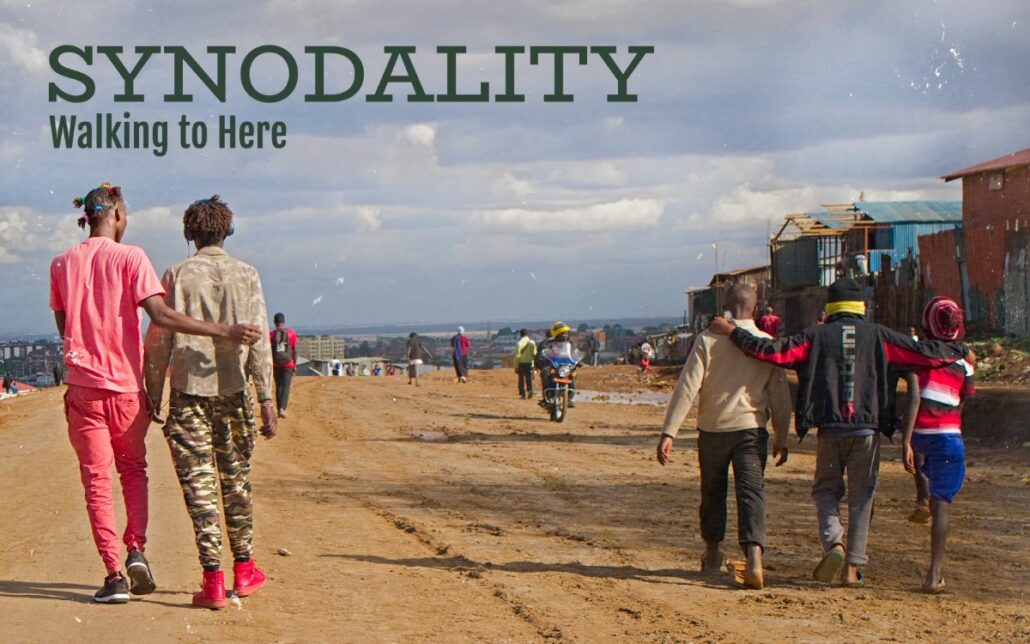See. Do. Be. Free.

Issue 015
An Open Letter to the Community around this year's theme.
Greetings,
We’ve come to the final reflection in our series on synodality. We’ve spent the last year exploring how to become a synodal community who “walks together” across difference for the sake of the most vulnerable, discovering our shared humanity along the way.
As we draw this series to a close it’s worth remembering that the synodal journey is not just for thrill seekers who have an appetite for adventure. We are all called to walk the synodal path. It’s how we become human. But let’s be clear, it’s not for the faint of heart. The risks are real. Stuff happens. Friends become enemies. Things fall apart. Violence erupts. Stock markets crash. Our bodies betray us and so do those we love. The orcs, goblins, and trolls of life close in.
Sooner or later, like Frodo, we get separated from our company and find ourselves alone and hopelessly lost. All we want is to return to the Shire and the safety and warmth of our Hobbit hole. I have felt this more than once. David Wagner’s deeply caring and wise poem speaks to all who lose their way and long to be found.
LOST by David Wagner
Stand still. The trees ahead and bushes beside you
Are not lost. Wherever you are is called Here,
And you must treat it as a powerful stranger,
Must ask permission to know it and be known
The forest breathes. Listen. It answers,
I have made this place around you.
If you leave it, you may come back again, saying Here.
No two trees are the same to Raven.
No two branches are the same to Wren.
If what a tree or a bush does is lost on you,
You are surely lost. Stand still. The forest knows
Where you are. You must let it find you.
I love the tender but firm voice of this poem. Clearly, there is genuine concern for whomever is lost, but notice the no-nonsense, urgent imperatives. Twice we are told to “stand still” and three times we are told, “you must…you must…you must.” These are not the flimsy sentiments of a dreamy poet. They are life-saving truths of one who knows what it means to be irretrievably lost and is trained in the art of being found.
The poem ends with these lines, “The forest knows where you are. You must let it find you.” Yes, our job is to let ourselves be found! These lines are reassuring and delivered with the urgency of one who knows what’s at stake.
This poem matches my own experience, but it messes with my theology.
Notice how the found-ness described in the poem doesn’t happen by extracting us from our situation, returning us to the safety of our Hobbit hole. It locates us in the here and now. “Wherever you are is called Here.” And we are told, in no uncertain terms, that we “must treat Here as a powerful stranger.” We must “ask permission” to know and be known by whatever it is.
Whoa!
This is seriously counterintuitive stuff and hard to do when we’re in a panic. When things fall apart I desperately want the Spirit to function like a search and rescue operation and get me the hell out NOW! Forget the powerful stranger! I want to escape “Here” and go “There” as quickly as possible. But that’s not how the Spirit works. Instead, the Spirit invites us to stand still, listen and ask permission to know and be known by the powerful stranger in whose presence we stand. This is how we are found and this is how the journey continues. This is how we become human.
We see something like this happening on Easter when the disciples are locked inside a room, fearing for their lives, utterly and completely lost. They are terrified of Here. And so Jesus stands among them as a powerful stranger. He says, “Peace be with you.” Their hearts are still. They are calm enough to feel Jesus’ breathing. They listen while he breathes into them his own life force. His Spirit will be their constant companion. This empowers the disciples to live out the synodal call they are being given, “As the Father sent me so I send you.” Jesus doesn’t order their every step. He simply sends them. He gives them immense freedom to sort things out along the way. They must make the road by walking and they never walk alone. His one clear instruction is that they forgive as they have been forgiven. This is how they become co-creators that call forth new creation. This is how their hearts (and the road) open up into some larger way. This is how we know and are known. This is how we become lost. This is how we are found.
Peace,

Kris Rocke
